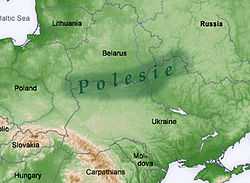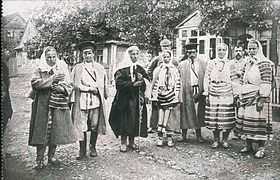Polishchuk
|
Polishchuks from Kobryn (1916) | |
| Regions with significant populations | |
|---|---|
| 9[1] | |
| Languages | |
| local dialects | |
Polishchuk (Ukrainian: Поліщук, Poliščuk (Polishchuk); Belarusian: Паляшук, Paliašuk; Russian: Полещук, Poleshchuk; Polish: Poleszuk) or Poleshuks is the name given to the people who populated the swamps of Polesia (Polesie). The Polishchuk dialect is close to the Ukrainian, Belarusian and Polish languages; it maintains many local peculiarities of other languages and dialects of the area.[2]
History

During and after the World War II, the Polishchuks along with Belarusian people developed a strong sense of identity and currently the Polishchuk group is one of the distinct cultural and ethnic parts of Belarus, while most of the population of the Polish and Ukrainian parts of the region of Polesie have assimilated with the respective nations. At the end of the 1980s, there was a minor campaign in Soviet Belarus for the creation of a separate "Polesian language" based on the dialects of Polesia launched by Belarusian philologist Mikola Shylyagovich and his associates. However, they received almost no support and the campaign eventually melted away.
See also
| Wikimedia Commons has media related to Polishchuks. |
References
- ↑ Етнографічні групи: поліщуки (з українською самосвідомістю) Державний комітет статистики України.
- ↑ The Slavic Ethnogenesis Citation: J. Rostafinski was able to locate the ancestral homeland of the Slavs in the marshes along the Pripet River in Polesie, generally in the south-eastern Poland and north-eastern Ukraine area (Curta 2001, p. 8).
